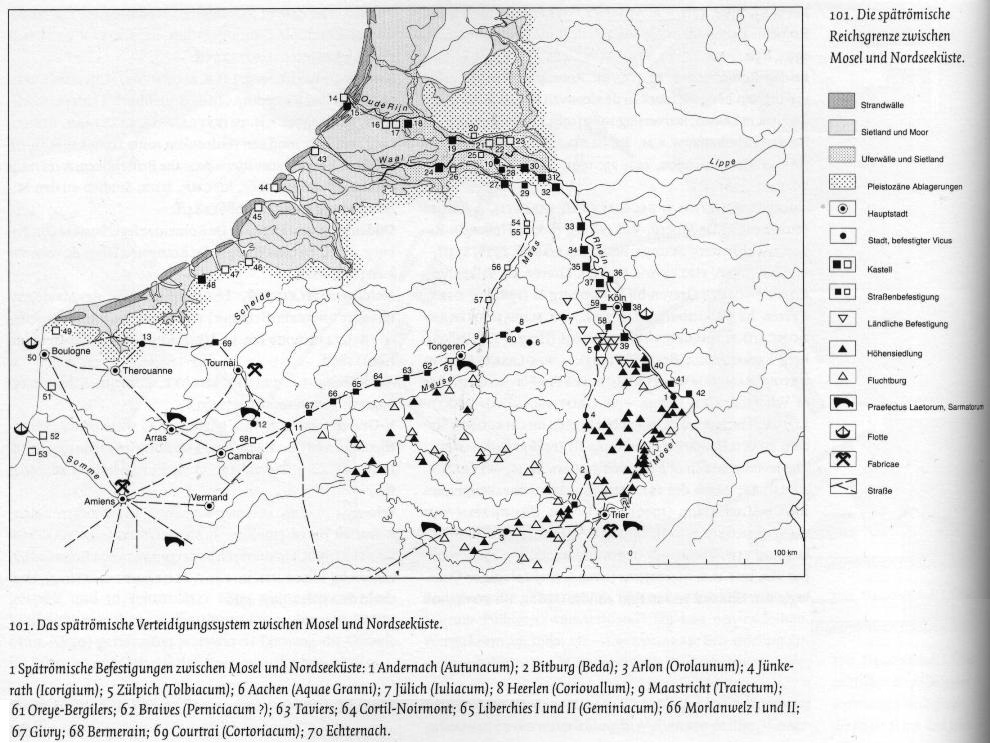
Dacian sacrifice
G - FGC6624

Laat Romeinse verdedigingslinie, noordgrens

Dacian sacrifice |
G - FGC6624 |

Laat Romeinse verdedigingslinie, noordgrens |
G-FGC6624 ontstond 6200 v.Chr. in AnatoliŽ.Algemeen wordt aangenomen dat de voorouders van deze lijn in West-AnatoliŽ leefden. Eeuwen daarvoor waren zij tezamen met andere G groepen vanuit Centraal AnatoliŽ naar een drietal regio's in West-AnatoliŽ getrokken: het merengebied bij Antalya, de kusten aan beide zijden van de EgeÔsche zee en rond de zee van Marmara, bij Barcin HŲyŁk. In deze regio's leefden de G2a2a- en de G2a2b-groepen en van daaruit trokken ze rond 6000 v. Chr. Europa binnen. Zij introduceerden daar de landbouw en een nieuw soort aardewerk Lineaire Band Keramiek, LBK. Rond Maastricht bloeide deze cultuur van 5300 tot 4900 voor Christus. Op de Cannerberg, tussen Maastricht en Heukelom, zijn archeologische resten ontdekt van een neolithisch dorp. Aan het begin van de ijzertijd, rond 2500 v. Chr. wordt de bestaande bevolking in Europa vervangen door een volk afkomstig uit de Russische steppen. Hun mannen waren dragers van haplogroep R. Dragers van haplogroep G2a2a, onze verwanten, zijn dan weer verdwenen. * Onze voorouders zijn waarschijnlijk altijd in AnatoliŽ gebleven tot 1000 v. Chr. Toen splitste onze stamlijn zich in twee takken. Ik noem ze hier de tak MoldaviŽ en de tak Benelux. |

G - FGC6624 kreeg rond 1100 v.Chr. twee takken 
|
Moldavia FGC6624*De tak MoldaviŽ heeft G-FGC6624*. Het sterretje duidt aan dat er in deze tak slechts ťťn familie bekend is, de familie Ghemu. Hun stamvader is waarschijnlijk in een grote groep mensen die allen haplogroep G hebben in de elfde eeuw uit het Byzantijnse Rijk, nu Turkije, gekomen. Zij waren van het Oosters-orthodox-christelijke geloof. Zij kwamen vůůr de latere islamitische invasies. (1) |
Benelux FGC6618De Beneluxtak heeft een eigen SNP, FGC6618. Dit is omdat zij verder vertakt is. De stamvader hiervan ging in de Romeinse Tijd naar Gallia Belgica. Hij kan een legionair of een koopman geweest zijn. Uit hem ontsproten in het begin van de middeleeuwen of nog in de laat Romeinse tijd drie takken, waaruit de families Marres, Slootmaekers en Nolet stammen. Ze wonen allemaal in de Maasvallei, de eerste twee rond Maastricht, de familie Nolet woont rond Namen. (2, 3) |

|
De drie takken
|
|
Nolet FGC34750 |
Morech FGC6634 |
Slootmaekers FGC42426 |

Gesplitst in twee takken in het jaar 1490.

|
Marres
|
Mares
|
HaplotypenDYS markers in een blauw veld - DYS waarden in licht geel - een genetische mutatie meer in beige - twee in bruin - een minder in licht groen - twee in groen - meer donkergroen.
| ||||||||||||||||||||||||||||||||||||||||||||||||||||||||||||||||||||||||||||||||||||||||||||||||||||||||||||||||||||||||||||||||||||||||||||||||||||||||||||||||||||||||||||||||||||||||||||||||||||||||||||||||||||||||||||||||||||||||||||||||||||||||||||||||||||||||||||||||||||||||||||||||||||||||||||||||||||||||||||||||||||||||||||||||||||||||||||||||||||||||||||||||||||||||||||||||||||||||||||||||||||||||||||||||||||||||||||||||||||||||||||||||||||||||||||||||||||||||||||||||||||||||||||||||||||||||||||||||||||||||||||||||||||||||||||||||||||||||||||||||||||||||||||||||||||||||||||||||||||||||||||||||||||||||||||||||||||||||||||||||||||||||||||||||||||||||||||||||||||||||||||||||||||||||||||||||||||||||||||||||||||||||||||||||||||||||||||||||||||||||||||||||||||||||||||||||||||||||||||||||||||||||||||||||||||||